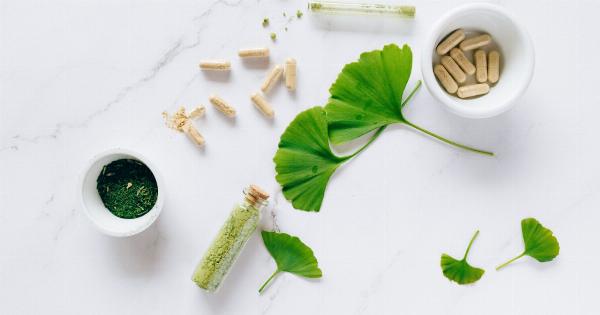A stroke is a medical emergency that occurs when blood supply to the brain is disrupted, leading to brain damage and in extreme cases, death.
According to the World Health Organization (WHO), strokes are the second leading cause of death globally, killing an estimated 6.2 million people annually.
Recovering from a stroke can be a long and arduous process. It requires medical attention, physical therapy, and proper nutrition. While there are no magic cures for stroke, studies suggest that certain supplements can help speed up the recovery process.
1. Omega-3 Fatty Acids
Omega-3s are essential fatty acids that the body cannot produce on its own. They are typically found in fish oils and supplements and are known to improve heart health, decrease inflammation, and improve brain function.
Research has also shown that omega-3s can help reduce the risk of stroke and improve recovery after a stroke.
A study conducted on rats showed that omega-3s can help reduce the severity of a stroke and improve cognitive function. Another study conducted on humans showed that taking omega-3 supplements reduced the risk of stroke by 6%.
2. Vitamin D
Vitamin D is important for overall bone and muscle health and is usually obtained from sunlight. However, certain populations, such as the elderly and those who live in areas with less sun exposure, may be deficient in vitamin D.
Vitamin D supplements can help improve bone strength and prevent falls, which is important during the recovery process after a stroke.
Research also suggests that vitamin D supplements can help improve cognitive function in stroke patients.
A study conducted on stroke patients showed that those supplementing with vitamin D had significantly better cognitive scores than those who did not.
3. Coenzyme Q10 (CoQ10)
CoQ10 is an antioxidant that helps to protect cells from free radical damage. It is naturally produced by the body but can also be obtained from supplements. CoQ10 has been shown to improve heart health, reduce inflammation and improve muscle function.
Research has also shown that taking CoQ10 supplements can improve the recovery process after a stroke. A study conducted on rats showed that supplementing with CoQ10 reduced the size of the stroke and improved brain function.
Another study conducted on humans showed that taking CoQ10 supplements improved physical function after a stroke.
4. Ginkgo Biloba
Ginkgo Biloba is a supplement derived from the leaves of the Ginkgo Biloba tree. It is known to improve memory and cognitive function and has been used in traditional Chinese medicine for thousands of years.
Research has also shown that Ginkgo Biloba can help improve recovery after a stroke. A study conducted on rats showed that supplementing with Ginkgo Biloba improved brain function and reduced inflammation after a stroke.
5. Vitamin E
Vitamin E is a powerful antioxidant that helps to protect cells from free radical damage. It is naturally found in nuts, seeds, and certain oils but can also be obtained from supplements.
Vitamin E is known to improve heart health and reduce inflammation.
A study conducted on stroke patients showed that supplementing with Vitamin E can improve cognitive function and reduce the risk of recurrent strokes. Another study showed that taking Vitamin E supplements can help reduce the size of the stroke.
6. Acetyl-L-Carnitine (ALC)
ALC is an amino acid that is naturally produced by the body. It is known to improve cognitive function and reduce inflammation. Research has also shown that taking ALC supplements can help improve recovery after a stroke.
A study conducted on stroke patients showed that supplementing with ALC improved motor function and cognitive function compared to a placebo group.
Another study conducted on rats showed that ALC reduced the size of the stroke and improved brain function.
7. Magnesium
Magnesium is an important mineral that is essential for overall health. It is involved in over 300 biochemical reactions in the body, including muscle and nerve function, blood sugar control, and blood pressure regulation.
Research has also shown that taking magnesium supplements can help improve recovery after a stroke. A study conducted on rats showed that supplementing with magnesium improved brain function and reduced inflammation after a stroke.
8. Zinc
Zinc is an essential mineral that plays a role in immune function, wound healing, and cell growth and division. Zinc is important for brain health and has been shown to improve cognitive function in stroke patients.
A study conducted on stroke patients showed that supplementing with zinc improved cognitive function and reduced oxidative stress.
Another study conducted on rats showed that supplementing with zinc reduced the size of the stroke and improved brain function.
9. Resveratrol
Resveratrol is a natural compound found in grapes, berries, and red wine. It is known for its antioxidant and anti-inflammatory properties. Resveratrol has also been shown to improve brain function and reduce the risk of stroke.
A study conducted on rats showed that supplementing with resveratrol reduced the size of the stroke and improved motor function. Another study conducted on humans showed that taking resveratrol supplements improved cognitive function in older adults.
10. Curcumin
Curcumin is a compound found in turmeric, a spice commonly used in Indian cuisine. Curcumin is known for its anti-inflammatory and antioxidant properties. It has also been shown to improve brain function and reduce the risk of stroke.
A study conducted on rats showed that supplementing with curcumin reduced the size of the stroke and improved motor function. Another study conducted on humans showed that taking curcumin supplements improved cognitive function in older adults.
Conclusion
Supplements can be a useful addition to the recovery process after a stroke.
While they are not a substitute for medical treatment, studies have shown that certain supplements can help improve brain function, reduce inflammation, and speed up the recovery process. However, it is important to talk to a healthcare professional before taking any new supplements, as they may interact with medication or exacerbate existing health conditions.































